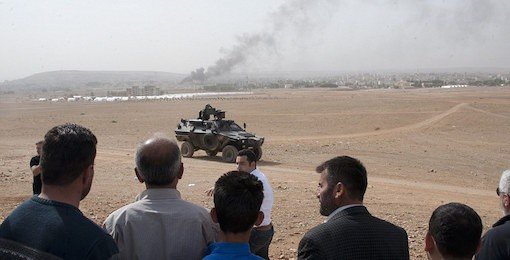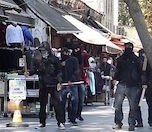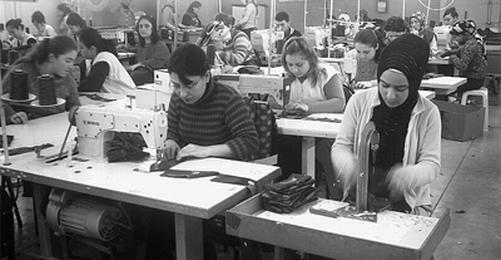ISIS has descended on us like a nightmare in the Middle East, forcing itself on all our agendas. This agenda may be new for us in Turkey, but one should note that the history of ISIS goes back a long way. ISIS took rapid root in Iraq, passed into Syria and now is fighting against the forces of YPG to take Kobane, the Kurdish city on the Syria-Turkey border. ISIS has killed thousands of innocent people, and now forced tens of thousands to leave their homes and live in tent-cities. Thousands of women are being sold on a slave market by ISIS, and some of them raped. ISIS terrorizes over daily life where it has seized control.
As ISIS approaches Mursitpinar, on the border between Syria (and Kobane) and Turkey, where the YPG is fighting against ISIS, the AKP has done nothing. On the contrary, despite all the controversy in the western media, neither the AKP nor its supporters accept criticisms of their inaction.
The situation is far too complicated and hard for everyone in Turkey. ISIS potentially taking Kobane and attacking people on the streets and in universities, showed us that the danger was at the door, and may even be already inside Turkey. All this has led to a profound change in our political lives. In fact, Turkey’s daily life has changed in the space of a few days.
Protests and a potential Islamist base
Protests emerged after the pro-minority rights opposition party’s call (HDP) for support for Kobane. Thousands of Kurds, leftists, socialists and various sectors of society went to the streets to protest in different cities, especially in the eastern Kurdish cities and in Istanbul. They were greeted with considerable violence. Efkan Ala, the Minister of Interior has stated that the death toll is 35, and the media reported that the death toll is 37. This was the toll taken in three days of protest. Some of these deaths were due to gunfire on the part of Turkish police and army forces. Cops and army forces attacked protesters with tear gas and water cannon. Of course this is not a new thing – that the Turkish government uses violence against Turkish protesters.
But what was most unsettling was the keen sympathy displayed by some sectors of the Turkish population towards radical Islamism or Islamic terror. Because the protesters were not only attacked and wounded or killed by police and the armed forces. They were also attacked by these supporters of violent extremism who came at them with sticks, knifes, machetes, swords, guns and shotguns. They too opened fire against anti-ISIS protesters and killed some of them. A pro-ISIS group in Istanbul University attacked leftist and Kurdish students with sticks and bottles repeatedly over ten days. By the way, police also attacked an anti-ISIS, pro-Kobane protest in Ankara University and detained students and scholars. On top of these events, a curfew was declared in a number of cities, mainly Kurdish cities. The fear and sense of profound turmoil has risen sharply, because of the many warnings which emphasize that ISIS may launch an attack inside Turkey, and that as a result it is dangerous to go outside, in the streets.
The groups mentioned which attacked anti-ISIS protests with sticks and guns actually contain elements from the mainstream parties, although they have hitherto been considered as ‘marginal’ groups. Except for Huda-Par which it is claimed has a connection with Hizbullah, the rest of the protesters are members of or at least fellow-travellers to the ruling party AKP (Justice and Development Party) and MHP (Nationalist Movement Party). It’s easy to identify this just by looking at photographs of the attackers. Both political leanings have a conservative-İslamist-nationalist character. So, there is sympathy for ISIS because of its Sunniness on the one hand, and there’s a hostility to Kurds because they are the main element which opposes ISIS decisively on the other hand.
So this is the conjuncture in which everyday life now finds itself in Turkey. The eruption of sympathy towards ISIS all of a sudden, coupled with the rapid increase of hostility towards the Kurds, has unsettled everyone living in Turkey. Everyone fears that we might be plunged back into the bad old days of conflict before the September 12, 1980 coup d’état, or the period of counter-guerilla activities in the 1990’s. A short stroll on the streets of Istanbul is enough to see the apprehension in people’s eyes.
Doing politics in a changed daily life
How is it possible to conduct one’s-self and do politics in such a profoundly altered Turkey, one whose daily life, to put it bluntly, has been Middle-Easternized? The standard liberal exhortations to “decrease the tension” and “live in peace” in current conditions is simply not possible and not effective today. Even if these words are the ones we use in our political discourse, this won’t solve Turkey’s problem of Islamism and the hostile atmosphere. On the contrary, such discourses only mask the ongoing problem. The most common example of this is the superficial narrative that maintains that, “this [ISIS] is not the real Islam!” This argument simply frustrates attempts to find a solution to the danger which is ISIS and the political and societal problems that give rise to it.
Where we are now is confronted by a certain Islamism which has not been considered a real threat even a few years ago, but which is now a threat of major proportions to Turkey. Today, Islamists gain their strength from ISIS and use violence to attack protesters, and even innocent bystanders. So we must face up to the fact that an Islamic terror has now entered Turkey, removing any clear lines between moderate-Islam, radical-Islam and nationalism.
Turkey is facing difficult questions. It’s hard to find answers. But we can talk about two fundamental solutions. Firstly, we should construct a new and clear language of opposition which can expose discourses such as “this is not real Islam”. Secondly, Turkey should begin the search for a secular identity with a new content. This is a profound challenge - how can the Turkish state espouse a new and effective secular identity while the Islamists’ base is increasing rapidly. But still, if this does not happen, Turkey will become a Middle Eastern country which witnesses terrorist attacks every day, and which is dominated by a permanent civil war situation. (BM)
* This article originally appeared on opendemocracy website.







